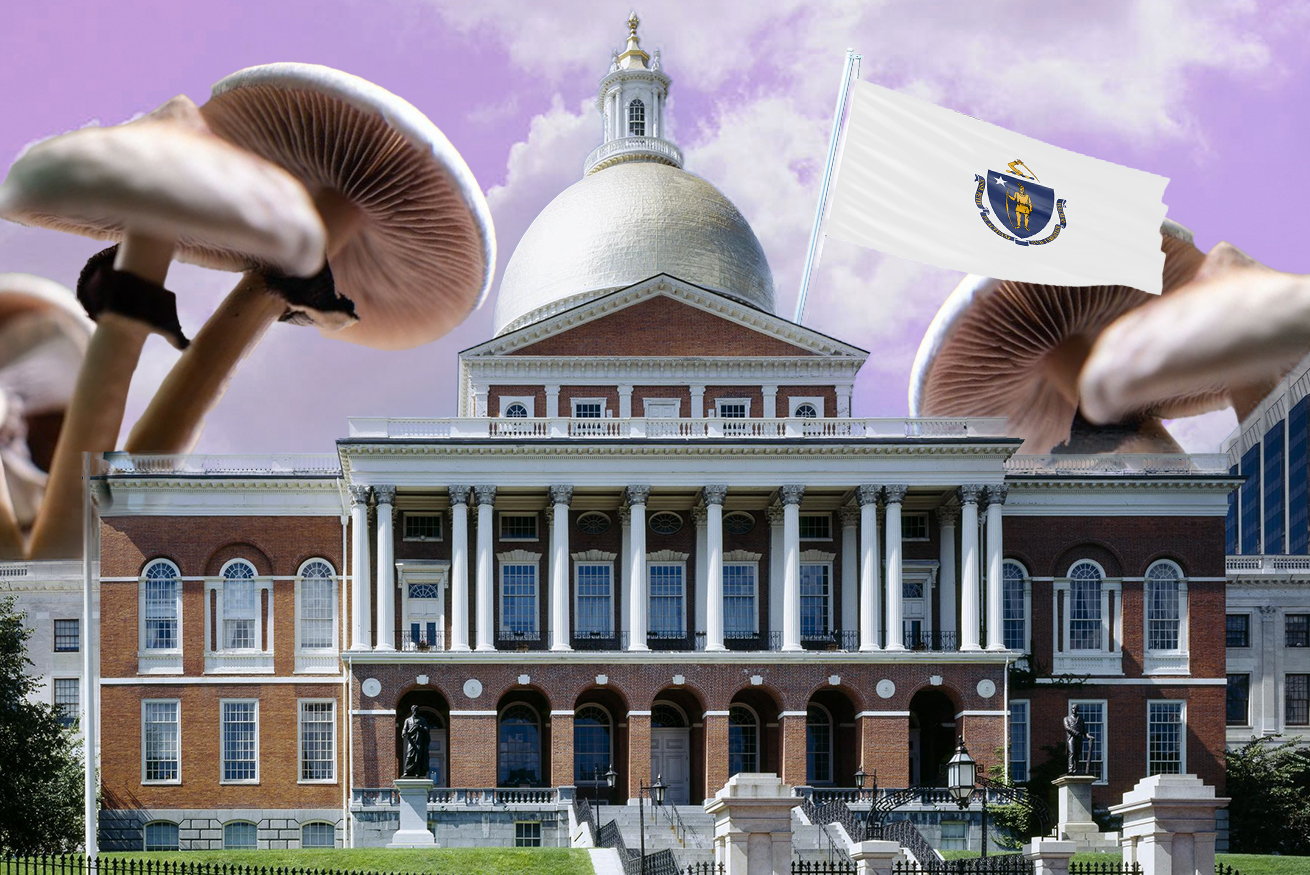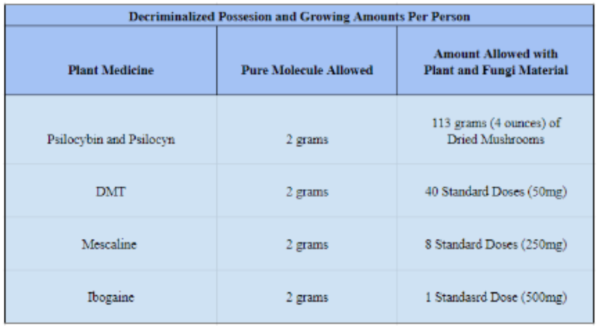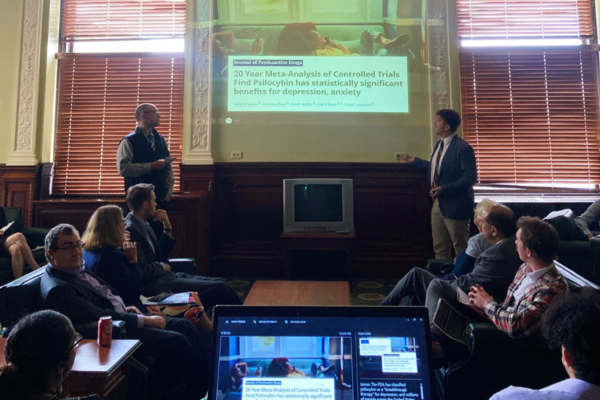
Bay Staters for Natural Medicine, a grassroots community group with more than three thousand volunteers across New England, has worked with five city councils to pass measures decriminalizing psychedelic plants, including psilocybin mushrooms. Now that the group has decriminalized more municipalities than any other state, it has turned its focus to legalization of psychedelics state-wide. The coalition has filed eight bills, more than any other state, and the best of these are summarized below.
H1754 and S1009: An Act Relative to Plant Medicine
Filed this year by Representative Sabadosa and Senator Jehlen, two state lawmakers who helped champion cannabis legalization, this legislation will go further than any bill filed to date anywhere in the United States to end all criminal charges for possession, use, growing, and non-commercial sharing of nearly 100 grams of dried psilocybin mushrooms and standard amounts of DMT, ibogaine, and mescaline. This effectively legalizes home growing psychedelic plants, as this table summarizes.
The trajectory of this bill was recently updated with help from Republican State Representative Nick Boldyga, who filed an update that will also prevent any risk of delicensing by mental health professionals for these activities and protect parents potentially impacted by childhood custody laws.
This legislation represents a further reaching model of legalization than has been presented anywhere in the country. Leveraging money from the New Approaches PAC, funded by multistate cannabis companies and pharmaceutical companies, the states of Oregon and Colorado have “legalized” some forms of psilocybin treatment but do not allow people to grow their own nor use it at home. This “legalization” model created an appointed board to write thousands of rules and regulations around use, forbidding the way that psilocybin has been conventionally used in the United States: at home or in nature with a trusted friend of a person’s choosing.
In contrast, this Massachusetts legislation presents a model where residents can grow and share their own psilocybin mushrooms as nonprofits and businesses push for future legislation regulating facilitation in a way that services can be accessible and affordable to everyone in need. In Oregon, the costs of care at treatment centers will be in the thousands of dollars, as dozens of Oregon counties have moved to roll back this top-down medicalized version of psilocybin legalization.
Notably, this legislation goes much further than California’s legislation, SB 58, which on property owned end criminal charges for “the possession, planting, cultivating, harvesting, or preparation” of psychedelic plants and fungi “on property owned or controlled by a person.” This means that renters, which represent about half of the population of California, could still face criminal prosecution or stressful police encounters if there is a disagreement with a roommate or landlord.
Massachusetts’ legislation also uses the age of 18, rather than 21, citing the need for young adults to use these substances in transparent and legal settings with intention. The prohibition of alcohol for adults aged 18 to 21 has created a culture of binge drinking and pregaming that leaves new college students more vulnerable to abuses and sexual assault at fraternities. “Young adults with neurological diseases and mental health challenges shouldn’t be criminalized for exploring this option. Criminalization is the opposite of education on safe use,” remarks Jamie Morey, a founding member of Parents for Plant Medicine, a Bay Staters Coalition partner.
H2137: An Act concerning the use of a prescription medicine that contains MDMA
A Republican State Representative, Nick Boldyga of Massachusetts’ Third Hampton District, has just filed HD2137, which will automatically reschedule MDMA if the federal government approves it for treating PTSD. Unlike similar legislation passed in Colorado, however, this legislation will put a price cap of $5,000 on these treatments. This price cap will be put in place to keep care affordable, since approval of MDMA by the Food and Drug Administration (FDA) will give a single corporation the exclusive right to sell the treatments for six to twelve years per the New York Times.
If $5,000 still sounds like a hefty price tag, it’s important to consider that MAPS is currently planning to charge $15,000 or more for each MDMA treatment if it is given exclusive rights to sell it under FDA exclusive authorization. Over half of Americans live paycheck to paycheck and cannot afford a $500 medical expense without going into debt. In fact, a MAPS partner organization, the Psychedelic Science Funders Collaborative, has admitted that the out-of-pocket costs for this care will be “prohibitively high for lower-income patients even if they have insurance.”
“We have countless PTSD-afflicted veterans struggling to just survive financially. The MAPS corporation is using these veterans to push for a monopoly. And they’re admitting that only the richest of the rich will be able to afford MDMA treatment. It’s sickening,” remarked Mike Botelho, a disabled Marine Corp Veteran and a founder of New England Veterans for Plant Medicine.
This monopoly also has critical implications for the mental healthcare system beyond MDMA. This is because the lucrative opportunity to charge these prices to high-income clients is leading many therapists to leave their practices that serve low and middle income residents at a time when Massachusetts already has a critical shortage of therapists.
“The solution is educating people on how to safely use psychedelics at home with a trusted friend,” said Colomba Klenner, the Communications Director for Bay Staters. “Most people can safely use ketamine, MDMA, and psilocybin at home and then simply see their therapist the week after to capture the same benefits without these unfair prices.”
H2002: An Act Relative to Harm Reduction & Racial Justice
Going further than any state legislation on the issue to date, this legislation will decriminalize personal possession amounts of all controlled substances in favor of a health review for individuals who are in critical need and suffering with a substance use issue. Bay Staters for Natural Medicine and its coalition partnered with Rep. Mike Connolly and Rep. Sam Montaño to ensure this bill was re-filed correctly this session. In contrast to Oregon’s Measure 110, this law would not create any fines. This models the policies of Portugal by offering a public health screening to people in need without any punishment.
A previous version of this legislation last session would have modeled these fines, yet luckily the Bay Staters coalition was able to get this new version filed without them. Creating fines for substance possession could ironically increase enforcement and police interactions because it creates a revenue stream for local and state governments at a time when police departments are already unofficially deprioritizing enforcement, particularly in the cities where Bay Staters has partnered with the city council. Fines also send the message that addiction issues are something to be punished, rather than treated just as a public health issue.
This change was only possible because individuals working for Tapestry, the WPI Democrats, the state and local libertarian parties, Healthy Streets Outreach Program, and the state's Harm Reduction Advisory Council shared common sense criticisms of fines with Senator Cyr. Advocates had been working for well over a year to have fines removed, yet had been largely ignored by lawmakers to the detriment of passing the best possible policy for the Commonwealth.
Ultimately, this legislation is critical to changing the paradigm around substance use, and it will have substantial benefits for community relations between police and the communities they serve. A public records request by Bay Staters found a two to one racial disparity in substance possession arrests in Boston, and many officers have long noted the tendency for these arrests to be concentrated in historically segregated neighborhoods owing to the higher density of patrol officers to address crime.
H.1787: An Act Automatically Sealing Cannabis Records & Promoting Uniform Digital Record Keeping
Massachusetts makes it notoriously difficult for individuals to go through the process to expunge their cannabis charges through CORI clinics, and the statewide system is primarily paper-based with extremely poor record keeping practices. Many of the vulnerable people convicted of cannabis charges still suffer through being denied employment and housing, and they are not well equipped to fill out almost seven pages of paperwork, advocate for themselves in court, and travel to the location of clinics and courthouses. This is why less than seven expungements for cannabis are completed every year when there are thousands or even tens of thousands of residents who still have these charges unsealed.
That is why Bay Staters for Natural Medicine partnered with Rep. Chynah Tyler, Rep. Sam Montaño, Code for Boston, and the Greater Boston Legal Foundation among others to push for this sealing to be automatic. Sealing, in contrast to expungements, means that people will still be able to access their records for social equity programs and immigration proceedings. But all the companies that mine the court data to help deny opportunity won’t be able to do that, and this bill will help digitize the data in a way that other controlled substances charges can eventually be sealed too.
Notably, the Boston Globe’s Dan Adams mischaracterized Rep. Chynah Tyler’s position on this question with incorrect and uncorrected reporting (despite outreach by journalists in our network):
Tyler’s bill would direct probation department officials to immediately grant eligible requests, but Edwards and other progressives want to see the state do more, and automatically expunge old pot charges.
“There’s still this sense that someone needs to make a case for themselves”, Edwards said. “I find that deeply offensive. No one should be begging a court to have their record expunged…”
The Globe unfortunately ignored follow up inquires for a correction and coverage of the automatic sealing legislation. Notably, the chief administrator of the CORI system has also ignored informational requests by Code for Boston and the Greater Boston Legal Foundation for information on how these records are kept, which would enable technologists to design a solution. Seven years after cannabis legalization, fewer than seven people each year are having their records expunged because of this sad state of affairs and a failure of journalism to bring attention to legislation to fix it.
Other Legislation:
HD3771 An Act concerning the legalization of certain natural plants and fungi (Rep. Boldyga): Similar to An Act Relative to Plant Medicine.
S1263 An Act regulating the safe use of psilocybin (Senator Moran)
HD3772 An Act concerning the legal use of the plant medicine known as psilocybin for therapeutic, spiritual, and medicinal purposes (Rep. Boldyga)
Contacts:
Representative Nick Boldyga: Nicholas.Boldyga@mahouse.gov
Colomba Klenner, Communications Director for Bay Staters for Natural Medicine:
team@baystatersnm.com






